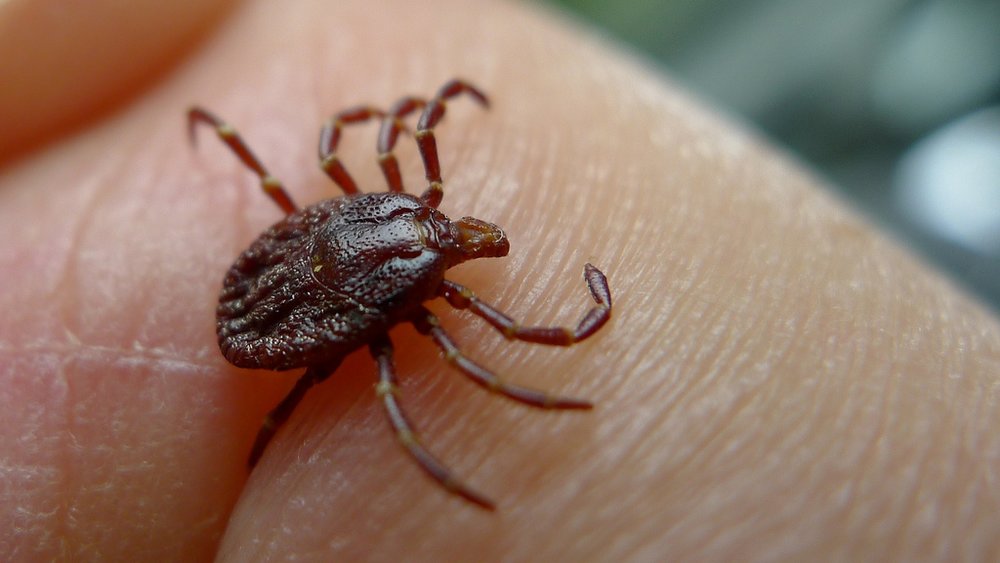
A New Tick Species in America is Growing Out of Control!

The winter is finally over, but the warmer weather has brought a new set of challenges for the people of New Jersey who are facing a tick problem which is multiplying quickly across the state.

A farmer in Hunterdon County discovered in August, 2017, that his sheep had thousands of ticks attached to its body
New Jersey’s Tick Problem
In February 2018, Journal of Medical Entomology revealed that an exotic type of ‘uptick’ called the Longhorned tick had somehow found its way to New Jersey but the scientists hoped that it wouldn’t be able to outlive the cold winter. However, the New Jersey Department of Agriculture made an announcement on Friday to follow up on the tick situation – and unfortunately, the uptick miraculously survived the subfreezing temperatures and may have now become a permanent resident of the area.
According to the publication, the uptick was first observed last summer in the beginning of August. Apparently, the first case of upticks reported in the state came from a farmer in Hunterdon County who discovered that his Icelandic sheep named Hannah was covered with thousands of little creatures after he sheared her.
The disgruntled farmed hurried to the nearby health office in his county to report the incident. From what he told the health office, poor Hannah picked up a few of the little companion months ago and the ticks multiplied into thousands under her thick coat of wool without the farmer even realizing until he sheared her. Sounds scary, right?
Where did the Sheep Pick up the Tick?
Health experts who inspected Hannah were alarmed by the number of ticks that that taken over her entire body. What was even more disturbing about the situation was that the tick species found on Hannah wasn’t native to New Jersey – in fact, it was rarely found in the United States! New Jersey has its fair share of ticks but the most common species found in the state are Amblyomma americanum, Rhipicephalus sanguineus, Ixodes scapularis, and Ixodes scapularis.
The exotic species of tick recently discovered is native to East Asia, Pacific Islands, Australia, and New Zealand which is why scientists are perplexed how it travelled to a country so far from its normal habitat. The investigators asked the farmer if Hannah had been to another country but it turns out that the sheep isn’t very adventurous and has never traveled too far from home.
Hannah has hardly seen the world outside her small Hunterdon County; we hope the investigators checked her passport and frequent flier miles to ensure that the farmer was telling the truth. So how exactly did the ticks get inside the United States and find Hannah the sheep? Experts are trying to find an answer to the puzzling question.

Scientists found that the exotic tick has an ability to multiplies without mating which makes its infestation all the more dangerous
Field Brimming with Larvae
The investigators who visited the Hunterdon property in October last year said that they were shocked by the tick infestation on the farm, and as soon as they had entered the paddock, the ticks had already crept up their legs. Apart from housing hundreds of fully grown ticks, Hannah’s body was brimming with other two stages of the small creatures including larva and nymph.
Most of the tick infestation was concentrated in Hannah’s ears and her face. Since these tiny living creatures love to hide and breed in obscure places, Hannah was the perfect candidate for the infestation with her thick coat of wool underneath which the Longhorn tick had excessively colonized. Majority of the adult ticks were found on Hannah whereas the rest of the field mostly contained larvae.
What the scientists found fascinating about the exotic tick was its ability to multiplies without mating which makes its infestation all the more dangerous. Experts expressed their concern about having to deal with another tick species which could spread in New Jersey and throughout the country. A tick infestation is never a good thing.
These little suckers – literally – attach themselves to human or animal skin and feed off their blood for days. Moreover, they could also transfer disease-causing microbes from one human or animal to another. Experts have washed the sheep with different chemicals in order to get rid of the tick infestation but even several months later, it has found a way to survive and is probably planning to hang around for a while.
More in Medical Conditions
-
Worried About Diabetes? Here Are Some Common Myths
There are several myths about diabetes that are frequently reported as facts. Diabetes misrepresentations can sometimes be harmful, leading to an...
June 29, 2023 -
Many Patients Pay Their Medical Costs Out Of Their Pockets – Even With Insurance
With rising inflation, it has become difficult for people to even fulfill their basic necessities. They are more concerned about how...
June 6, 2023 -
What Is The Right Weight For Kids And How To Gain Weight Healthily
Keeping your child happy and healthy is the primary concern of every parent. Parents usually focus on providing their young ones...
May 12, 2023 -
Thyroid Disorders in Children: What Parents Need to Know
Thyroid disorders are not limited to adults; they can also affect children. The thyroid gland produces hormones that play a crucial...
April 29, 2023 -
Should Doctors Attend To Patients With ‘Do Not Resuscitate Tattoos’?
Doctors at the University of Miami hospital were confronted with a dilemma when a 70-year-old unconscious man with a tattoo “do...
April 3, 2023 -
Your Antidepressant May Not Work If You Keep Doing This One Thing
People use social comparison to measure their self-worth. Social comparison has been in existence since time immemorial, and it is as...
April 1, 2023 -
Pro Tips on Preventing Hair Breakage While Keeping Your Hair Moisturized at Home
Every one of us is thinking a lot about how to forestall hair breakage and keep them moisturized at home. Since...
March 22, 2023 -
Planning to Travel After Retirement? This is the Best Medicare Coverage for You
Does Medicare insurance go with you once you are out of the country? It’s currently open enrollment period, and while planning...
March 14, 2023 -
Lumeris, A Medical Insurance Provider, Expands Into 5 New States & 44 Counties
Lumeris is one of the leading insurance providers in the United States. For years, the Saint Louis, Missouri-based firm has been...
November 8, 2022















You must be logged in to post a comment Login